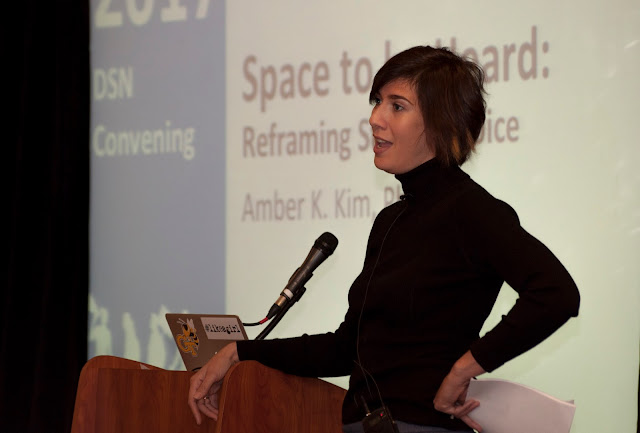Guest Blog: Space to be Heard
by Brad Hubbard, Ed.D, Principal, Antioch Community High School
Foreword by Sonia Mathew, Civic Learning Manager, Robert R. McCormick Foundation
Over 200 attendees participated in the Democracy Schools Network Convening which took place last month on March 9-10 with the theme “Students as Agents of Change”. This year, we recognized and celebrated 13 new Democracy Schools that joined the network. The Network now encompasses 54 high schools with representation in Chicago, its surrounding suburbs, the Metro East region outside of St. Louis, and both Central and Southern Illinois. Dr. Amber Kim from the University of Colorado gave a keynote address which emphasized the importance of breaking down barriers that limit student voice in schools. Special thanks to Brad Hubbard, Principal of Antioch Community High School (2015 Democracy School), in Antioch, Illinois for sharing his powerful reflection on Dr.Kim’s keynote address."We must be able to sit in the pain and pride of a student's narrative."
- Dr. Amber KimDr. Kim teaches and talks about "equity literacy." She sees her work as anti-oppression work. Meaning, we have to create systems and spaces in schools that do not oppress or silence individuals or groups of students. Her message was powerful, poignant, timely, thought-provoking, and emotional. She told a number of stories, used great videos, and shared some important realizations that she has discovered. Two of the messages I feel compelled to share, are as follows:
1. There is no such thing as the voiceless. Everyone has a voice. With that said, there are certainly situations in which voices are not expressed, heard, or permitted to matter. Dr. Kim argues that we need to create the space in which voices are afforded real opportunities to be heard and matter. She says that true voice must include expression and power. We need to create systems and environments in which everyone feels their voice is valued, critical, welcomed, and influential. Voice is so critical in the creation of the circumstances in which people can learn and flourish. We talk so much about relationships, but those relationships are not deep, genuine, or impactful if the voices within those relationships are not real, respected, and taken into account. We talk about student voice and work to provide opportunities for it to be heard. As I step back and look at the systems we have in place, if I am being honest, there are explicit and implicit barriers within our structure that deter, impede, and/or dismiss the voice of some of our stakeholders. I...we...can do better. One way is make sure the voices we solicit have power...that leads me to my next takeaway.
2. We need to foster within our learning community, the idea that everyone's voice has power. We cannot solicit it, pretend to hear it, and then move on as previously planned. We need to create multiple opportunities for all of our stakeholders, especially our students, to be able to articulate their needs and see action as a result. We need to share and, in some cases, hand over the decision-making power and demonstrate trust in our students throughout a process of sharing leadership. Our students' voices are the most critical in the equation of education. But, it is hard to want to engage and exercise voice when there are no results. So, I know I need to be, and I suspect we all could be, more cognizant of the explicit and implicit ways I am silencing or not hearing the voices of our students...all of them.
Dr. Kim told a story about voice and power that made me tear up. She said her husband was tickling their young daughter one night and while she was laughing and have a fun time, she was saying, "stop." Now, I do this with my girls all the time...in fact, Bryn thinks I am "the world's best tickler." They say, "stop" regularly and it never phases me, so long as it is said in the playful way. On that night, however, Dr. Kim later said to her husband, "When she says stop, I'm going to need you to stop." Her husband at first questioned it, but Dr. Kim went on to articulate that their daughter needs to know her voice has power. When she says, "stop," she ought expect that whoever she is speaking to, even if it is dad, stops. I could not agree more and this weekend, I was intentional about stopping and starting to ensure that Calla and Bryn know their voices have power.
While this story hit me as a father, it also resonates as an educator. Our students have voices and they are using them all the time. We need to find ways of not just allowing, encouraging, and permitting them. Rather, we need to truly hear, offer some power to, and continue creating the spaces for students to share, speak up, ask, disagree, and/or use their voice.
I want to thank Dr. Kim for such an inspiring and moving keynote on Friday. It has had me thinking...





Comments
Post a Comment